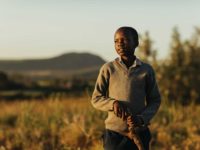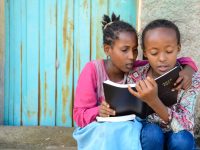Part of what forms our definition of poverty and our holistic approach to ministry is the recognition that poverty can be an internal condition resulting from an external message of oppression.
“At its very core, poverty is a mindset that goes far beyond the tragic circumstances. It is the cruel, destructive message that gets whispered into the ears of millions by the enemy Satan himself: ‘Give up! You don’t matter. Nobody cares about you. Look around you: Things are terrible. Always have been, always will be. Think back. Your grandfather was a failure. Your parents couldn’t protect or take care of you. Now it’s your turn. You, too, will fail. So just give up!'” — Wess Stafford
The internal condition of poverty is one of disempowerment, fatalism, hopelessness and lack of initiative. The person in this condition will often be a victim of his circumstances rather than an agent of positive change in his community.
That person’s extremely low self-view will translate into a low regard for others and likely into damaged relationships. Damaged relationships then reciprocate and reinforce the message of worthlessness.
The belief that “it won’t get any better” may undermine initiative. It may not matter how many opportunities are created, because the effort of striving, risking and capitalizing on those opportunities requires a belief in the possibility of a better future.
The majority of individuals in that state are incapable of transformational development. To sum it up in one word, they lack hope, and hope is a major engine of growth and wellness.
The marred identity includes a self-view of powerlessness, of being victim to circumstance, of not only low self-esteem but also a projection of low value on others in the community.
When one sees poverty as having its root in human identity [self-concept], then it profoundly impacts the strategies chosen for development.
When one defines poverty primarily as an internal condition resulting from external devaluing messages, it holds significant implications for poverty-fighting strategies. One must ask:
- How and when did the internal condition become entrenched?
- How can “the lie” be exposed and the person freed from its oppression?
- Can we prevent it from being heard or being believed?
It also becomes clear that when the lie is deeply entrenched in adults it is difficult to reverse. However, intervening early in childhood offers the best opportunity to reverse or prevent the lie from gaining traction in the identity-shaping stages of human development.
There are pivotal moments in human development, defining moments, that shape long-term self view and identity. Those pivotal moments must be won by truth and not by “the lie.”
- The lie speaks in abuse; the truth must protect.
- The lie speaks by ignoring; the truth must listen.
- The lie criticizes; the truth must praise.
- The voice of truth must carry throughout the early and most vulnerable stage of human development to break the power of the lie.
The statement “poverty is a lie” is not meant to deny the reality of poverty. Poverty is absolutely real. Nor is the statement meant to imply that overcoming poverty is as simple as a change of mind. And the statement certainly does not mean to blame the victim in the sense that they were the person who chose to believe the lie.
Rather, the concept conveys the idea that we are surrounded by false messages about who we are — about our nature, power and value. These messages mask the truth of our identity:
We are people made in the image of God, granted unique talents by God and capable of receiving the Holy Spirit. We are dearly loved by God.
All of us believe “the lie” to some degree, but for the poor it is debilitating.







9 Comments |Add a comment
You can’t be truer and more precise than this man. I study Social Work and live in Mexico City. I’ve seen this story again and again in people’s lives around me.
Provocative and challenging. Thanks for starting this dialogue.
This post is true to their word. Great post Scott.
This in an interesting perspective on how a “label” can lead to false hope and self-image that may be hard to escape unless transformational thinking occurs. I actually agree for the most part. I think in some circumstances, it is harder to really get out of deep poverty, especially when it is prevalent among the entire community. But, there are instances the self-defeating thinking can really prevent someone from making a positive change. Thanks for the post!
I wrote a blog very similar to this on my blog a while ago! Great write scott, very empowering. The lie is silenced by love and hope.
I do agree that poverty is the lie that has been told or spoken to the poor through years of substantial failures to free themselves. Yet I feel that the poor do not necessarily have it in them to extricate themselves out of poverty. As in the Spiritual realm, we are not capable of receiving the Holy Spirit (it is an external gift, Ephesians 2:8-10) in the same manner the poor are not capable of setting themselves free. That is why we need the Church of Christ to set the captives free. Salvation, physical, social, and spiritual is always external. Deliverance always comes from God who is external to us. Just as the sinner cannot become clean by his own will and might, just as the Leopard cannot change his spots, so also the poor cannot extricate themselves from poverty. They do not have it in them. They need God working for them and along side them as we pray, give and work with them.
This is an excellent post Scott — you always write so well! I will remember this as I write my children and as I relate to students in our own school! Thank you.